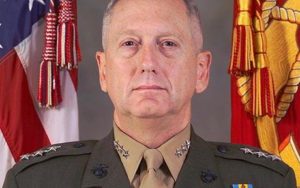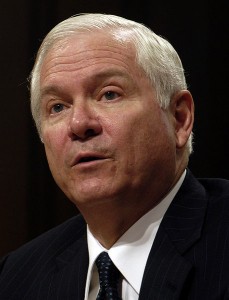Given how militaristic the State Department has become, it might make sense for President-elect Trump to turn to generals for his national security team, but there are risks in that, too, says ex-CIA analyst Melvin A. Goodman.
By Melvin A. Goodman
President-elect Donald Trump probably never read Fletcher Knebel and Charles Bailey’s Seven Days in May in 1962 and never saw John Frankenheimer’s film version in 1964, which dealt with the threat of a military coup due to opposition to a nuclear disarmament treaty with the Soviet Union during the Cold War.
President John F. Kennedy read the book after the Cuban missile crisis and found the scenario credible, probably because of the opposition and bizarre antics of Air Force Chief of Staff, General Curtis LeMay, during the crisis. Perhaps Donald Trump should become familiar with the book or the movie before he names one more retired general to his national security team.

Retired Marine General James Mattis, President-elect Donald Trump’s choice to become Secretary of Defense.
In a very few weeks, Trump has surrounded himself with a group of erratic advisers and has appointed several pugnacious and partisan figures to key national security positions. As a result, the appointment of retired Marine General James Mattis has been welcomed by the mainstream media, including the staid New York Times. The media’s consensus appears to be that, since Mattis, a four-star general, once outranked the controversial national security advisor, General Michael Flynn, a three-star, and, unlike the President-elect, actually reads and collects books that he will bring a voice of reason to the policymaking circle in the White House. Not so fast!
What Trump has done since his election one month ago is to threaten the balance that is needed between the civilian and military communities in national security decision making and to threaten civilian control over the military that has been in place since the Founding Fathers made it so.
Over the past 40 years, we have watched the military lose wars in Vietnam, Iraq and Afghanistan, while the Pentagon has accumulated greater influence over foreign policy. Since the creation of the all-volunteer military in the 1970s, the military has drifted too far away from the norms of American society, has become inordinately right-wing politically, and has become much more religious (and fundamentalist) than the country as a whole.
Over the past several decades, the officer corps has actively opposed the service of African-Americans, women and gays in their ranks. Anyone familiar with the military can testify to the “Republicanization” of the officer corps.
The often-ignored Goldwater-Nichols Act in 1986 enhanced the political and military role of regional commanders-in-chief (CINCs) and marginalized the Department of State and the civilian leadership of the Department of Defense. The CINCs have become more influential than U.S. ambassadors, who actually represent the interests of the President, and various assistant secretaries of state responsible for sensitive Third World areas.
The act created a more powerful Joint Chiefs of Staff (JCS) and made the chairman of the JCS the key military advisor to the president. During Desert Storm in 1991, the chairman often ignored the Secretary of Defense and personally briefed the President on war plans. It is noteworthy that the act passed the Senate without genuine debate and not even one vote of opposition.
Bill Clinton’s Role
President Bill Clinton made major contributions to the civilian-military imbalance in the 1990s, when he abolished the Arms Control and Disarmament Agency and the United States Information Service and substantially reduced funding for the Agency for International Development. Clinton also bowed to the opposition of the Pentagon when he walked away from international agreements that supported the Comprehensive Test Ban Treaty, the International Criminal Court, the ban on cluster bombs, and the ban on land mines.
President Barack Obama also tilted in the direction of the military in making key national security appointments. His national security adviser was a retired Marine General, James Jones, who failed miserably, and his first intelligence tsar was Admiral Dennis Blair, who also failed. Jones was replaced by Tom Donilon, whose expertise was in domestic affairs and who couldn’t stand up to the Pentagon in decision making on Iraq and Afghanistan.
Obama’s unwise decision to retain Robert M. Gates as Secretary of Defense also catered to the interests and preferences of the JCS. The President seemed to have no concern for Gates’s Cold War ideology, let alone his politicization of intelligence on behalf of the Reagan administration throughout the 1980s. When Obama appointed General David Petraeus director of the CIA, the militarization of the intelligence community was virtually complete.
During Obama’s presidency, the Pentagon has taken control over security aid to foreign countries, including allied nations overseas, which was once the province of the Department of State. The Pentagon has permanent control over certain aid programs and, by virtue of its counterterrorism activities in more than 80 countries, has greater control over U.S. policy options.
Once upon a time, the Department of State and the Agency for International Development controlled foreign aid; today the Pentagon can claim the title. Instead of building up foreign militaries, the Pentagon is far more concerned with assistance in assuring U.S. troop readiness.
In view of the international problems that will confront the new president and his national security team throughout the Middle East and the Persian Gulf, let alone bilateral relations with Russia, China and North Korea, it is worrisome that a purely military and authoritarian cast will be making key decisions. There is an important role for negotiation and diplomacy, including coercive diplomacy, in virtually every geopolitical challenge, but the president-elect has no interest in searching these fields for expertise. Similarly he will be making important decisions on defense spending and weapons acquisition, depending on advisers and cabinet secretaries who never have enough financial resources or weaponry.
There is the additional danger that Generals Flynn and Mattis will reinforce the President-elect’s “garrison mentality,” the notion of Fortress America, which is strategically insolvent and could become economically stagnant. American use of force since the end of the Cold War has served only to weaken the nation, draining resources, and costing the lives of far too many fighting men and women. It isn’t reasonable to assume that the authoritarian style of the senior officer class will reverse these trends.
General James Mattis will need a waiver from both the Senate and the House of Representatives in order to be confirmed as Secretary of Defense. Since the Department of Defense was created in 1947, only one general, George C. Marshall, has received such a waiver. Mattis should not be confused with George C. Marshall.
Melvin A. Goodman is a senior fellow at the Center for International Policy and a professor of government at Johns Hopkins University. A former CIA analyst, Goodman is the author of Failure of Intelligence: The Decline and Fall of the CIA, National Insecurity: The Cost of American Militarism, and the forthcoming The Path to Dissent: A Whistleblower at CIA” (City Lights Publishers, 2015). Goodman is the national security columnist for counterpunch.org, where this article first appeared.


The naming of so many former Generals to key para Military organisations like Homeland and State yes they have lots of armed members! and other organisation make the US ripe for a Military takeover, just think less than 70 miles from Jerusalem there are Insurgent Terrorists originally funded by State with the ability to sweep down out of the Golan Heights to attack Jerusalem and just think half way between there is the Plains of Armageddon, remember the comment above “the military has drifted too far away from the norms of American society, has become inordinately right-wing politically, and has become much more religious (and fundamentalist) than the country as a whole.” and you think there will not be a Military coup if such a thing was to happen and the President did not immediately react, and how does the PUBLIC stop such an action when the Military controls State Homeland and other agencies! As I said ripe for the Coup! Let us all hope that i am wrong!
The degrees of separation between the military and civilian controlled arms of government have been steadily decreasing for some time and this is nothing out of the ordinary in the scope of historical context. While it is certainly something to keep an eye on, and exactly what Eisenhower warned of with the growing Military complex, it would be entirely misleading to presuppose that American government and the military aren’t (& haven’t always been) inherently linked.
My prediction prior to the election was that Trump would win.
I have also predicted that once in office he will find it very difficult to work with Congress for which the Senate has already stated they intend to be very hard on any of Trump’s nominees.
Remember that Trump is not in office yet and when he does move into the White House he may find quite a few of his selections denied confirmation.
Nonetheless, what Mr. Goodman’s essay succinctly reinforces is that it is high time to abolish the executive branch since it no longer appears to be able to provide any rational to its existence with the exception of starting wars.
As one young, intelligent, university student said a number of years ago, the “United States is a country operating in the 20th century with an 18th century form of government”.
It is way past time for a major change…
I am committed to believing that Mr. Trump will never make it to “indoctrination” on Jan. 20.
What Trump has done since his election one month ago is to threaten the balance that is needed between the civilian and military communities in national security decision making and to threaten civilian control over the military that has been in place since the Founding Fathers made it so.
Several commentators in the recent past have observed interactions between Congress and the Pentagon and have been concerned with another version of the tail wagging the dog. In this case, the “tail” comprises the Pentagon and the military-industrail complex with the “dog” being Congress, especially the armed services committees.
“As Official Washington obsesses about Russia, the Obama administration is mounting a similar strategy against China, surrounding it and then accusing it of “aggression,”” as John Pilger explains. – https://consortiumnews.com/2016/12/04/picking-a-war-with-china/ – “The ascendancy of the Pentagon in Washington – which Daniel Ellsberg has called a silent coup – is reflected in the record $5 trillion America has spent on aggressive wars since 9/11, according to a study by Brown University. The million dead in Iraq and the flight of 12 million refugees from at least four countries are the consequence.”
pix = 1,000 words
http://www.zerohedge.com/sites/default/files/images/user3303/imageroot/2016/11/09/20161111_trump1.jpg
the end of the world
(as we know it)
Whoa! And we have an unstable personality who will be commander-in-chief. Good Luck to all of us.
I can’t wait to see the ‘in fighting’ of the generals to gain positioning.